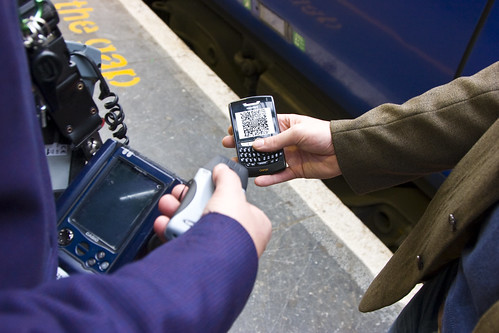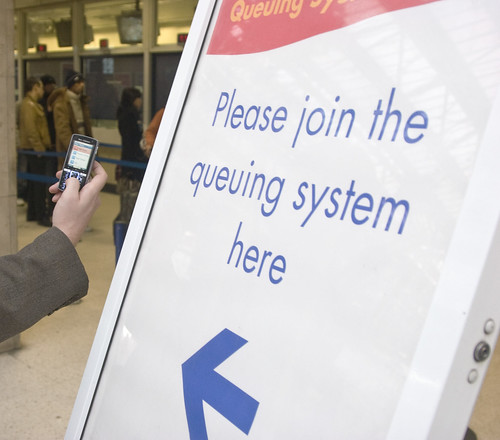Write up of the recent Intelligent Transport Systems' Seminar on Standards in UK Ticketing Wed 27th May 2009:
[ WARNING: The top third is mobile ticketing, the rest is more general transport stuff ]
Chair: Chris Queree, ATOC (Association of Train Operating Companies)
Speakers:
Andy Donelan, Virgin Trains
Grant Klein, Detica
Mark Cartwright, RTIG (Real Time Information Group)
Roger Slevin, DfT (Department for Transport)
 Masabi got to speak first, and played a potentially unpopular opening card by pointing out the marked difference in Capital Expenditure between the expensive rollout of a smart-card system, and the much cheaper rolling out of a barcode ticket system.
Masabi got to speak first, and played a potentially unpopular opening card by pointing out the marked difference in Capital Expenditure between the expensive rollout of a smart-card system, and the much cheaper rolling out of a barcode ticket system.Specifically, because of the fact that self-print and mobile delivered barcode tickets all have a human readable version of the ticket alongside the machine-readable barcode, means that in initial rollouts the vehicle guards can simply check the tickets visually, the same way they check existing paper tickets.
Occasional spot-checks of the e-tickets can be made by texting the manual ticket number to a central service, and a small number of shared scanners that guards or stations can use on rotation.
Permanent rollout of scanners and gates can then be staged for areas that see large volumes of e-ticketing, but completely avoided in those areas that only see a low frequency of e-tickets.
Smart-cards by comparison have no visual indications at all, and even the card owner cannot know what is on the card without a machine to interrogate the card. Any area that wishes to use smart card must be fully equipped with scanners before launching the service, meaning that the full capital expenditure must be comitted before the first users can start.
It was also pointed out that in London there is a significant financial penalty for people that refuse to use Oyster, with many fares being twice as expensive on a paper ticket. The proposed national ITSO smartcard system for rail tickets will almost certainly not have such a price difference (if any) to drive uptake.
We also haven't got to the bottom of how a national rail smartcard journey would be purchased by the consumer - I think you would still need to buy on the web, or queue at a ticket machine at the station to configure your journey before collecting it onto the smartcard, which won't reduce queues at all. (Oyster-style charging is not an option outside London.)
 Masabi's presentation then got into the main topic of the new RSP barcode standard for UK rail tickets on mobile and self-print, highlighting some of the enhancements that provide better security, robustness, and cross-sales opportunities than previous barcode standards, and encouraged operators and other ticket sales companies to find ways to exploit it more.
Masabi's presentation then got into the main topic of the new RSP barcode standard for UK rail tickets on mobile and self-print, highlighting some of the enhancements that provide better security, robustness, and cross-sales opportunities than previous barcode standards, and encouraged operators and other ticket sales companies to find ways to exploit it more.The 3rd party opportunities come from the fact that under this scheme you can freely give away the ticket scanning software and public security keys, so that Coffee Shops, Retailers and major attractions like Alton Towers can all integrate ticket scanning and validation into their EPOS (tills) and gates (as long as they have an off-the-shelf 2D barcode scanner), and be able to read/verify the new rail tickets and any cross-sale entitlements that are inside, such as your early morning coffee and bagel, bought at a preferential rate, or alternately your group purchase of a weekend getaway including a music gig entry in one ticket.
Masabi also showed off a bit of their mobile ticket sales product, and the opportunity for it to reduce rush-hour queues at stations, and reach out to users when they are most in pain and keen to try a new system, i.e. when the queues are long, or when the ticket machine is broken - that's when a (non-geek) consumer will try a new way to purchase and travel.
(For people that haven't heard of it yet - the Masabi Mobile Ticket Machine allows a customer to buy a ticket straight from the phone, using a credit card, and then get the ticket on the phone. They don't need any sign up either, they can do it straight away, from the queue.)
Masabi Rail Ticketing ITS
View more presentations from Ben Whitaker.
There were a lot of questions from the floor, getting into the anti-copying and some of the low end (legacy) handset support issues that the new ticket standard addresses.
Then Andy Donelan from Virgin took the stand to tell everyone about Virgin Railways' success with barcode ticketing, this time focussing on the printed barcodes, and their part in "driving down distribution costs".
He said that consumers had been very keen on the new system, so the initial pilot has been rolled into full production use since September 2008 across all of their routes, taking over 4M in revenue, with over 1000 e-tickets sold per day.
For clarity - currently Virgin's printed barcode tickets are only valid on advanced tickets on Virgin-only routes. Virgin are now in discussions with Train Operators such as Cross Country that they share routes with to agree to honour each-other's barcode tickets too, so that these restrictions can start to lift, and more routes and fare combinations will be supported by the barcode format. (author's note - paper barcode tickets and mobile barcode tickets share the same format and the same scanners, so every rollout of paper barcode paves the way for mobile too.)
He also revealed that as a long-distance route, their proportion of tickets sold on line was 35% - far higher than the national average of 12%, and they expected that to continue to grow.
Their strategy was to enable remote booking as much as possible to easily expand their sales capacity, as they can't increase the number of ticket windows at their stations to cope with increasing demand.
 One of the benefits Virgin found with the user-printed paper barcode ticket, (much larger than standard card rail tickets in the UK) is that they can contain the full travel terms and conditions of the ticket, which makes it easier for revenue enforcement officers (guards) to say that the traveller should know exactly what they are entitled to, in a way that the very small existing tickets do not. For our international readers, the "conditions of carriage" or rules of the railway ticket vary by route and ticket in an almost impossible to understand way, and there are large fines for mis-understanding the special restrictions known only to guards and railway experts.
One of the benefits Virgin found with the user-printed paper barcode ticket, (much larger than standard card rail tickets in the UK) is that they can contain the full travel terms and conditions of the ticket, which makes it easier for revenue enforcement officers (guards) to say that the traveller should know exactly what they are entitled to, in a way that the very small existing tickets do not. For our international readers, the "conditions of carriage" or rules of the railway ticket vary by route and ticket in an almost impossible to understand way, and there are large fines for mis-understanding the special restrictions known only to guards and railway experts.In good news, they have had very few customer support requests about their e-tickets.
Interestingly, their initial trials of hand-held barcode scanners at Euston faced issues from dropping off-line when they went underground, so this would certainly be aided by the new off-line scanning capable ticket standard that has come in since they started their trial on previous on-line only tickets. It is exactly this sort of resilience that we have added to the standard to make it practical for real-world rollouts.
Andy agreed with the points that Ben had made, and saw mobile and self-print as complimentary, each suiting slightly different use cases, but both useful in servicing the travelling public, mobile especially suiting business travel travellers, self-print more for infrequent travellers.
The chair, Chris Querry summarised the morning talk by observing that barcode is growing of its own accord on it's own commercial merits, but he could only see Smartcard gaining much ground through legislation and franchise commitments forcing it to happen. "People will vote with their feet, or more likely their barcodes about which e-ticketing platform to use."
The next talk by Grant Klein from the hosts, Detica, covered some of the reporting and tracking requirements of e-ticketing, allowing more accurate data to be gathered about how many travellers there really are, and what their habits are. With paper tickets, just like cash transactions, all you can be sure of is the number of journeys, but you have no idea about how often those journeys are the same person - etickets instantly give you all of the benefits of loyalty cards in this respect for tracking users and building a history.
Chris Querree then gave a run-down of new public transport standards work in Europe, helping attendees to make sense of where each of the seperate, overlapping, and sometimes cooperating standards bodies is going.
From a ticketing point of view, I noted down the UIC 981-2 standard being used in Europe for long distance train tickets, CEN TC278 WG3 SG5 for ticketless travel, and security on self-print to follow up on later, but anyone else wanting to find the details on more standards work should get hold of Chris's actual presentation.
Mark Cartwright from the Real Time Information Group (RTIG.org.uk) talkup us through the efforts to unify access methods for joining transport and journey information accross multiple sources and viewing platforms, to support web and physical signeage and querying, such as the in-bus shelter wait-time indicators, and the unified journey planner websites.
Roger Slevin then took the final speaking slot to fill us in on some of the work that DfT were involved in, mostly on the passenger information side, following on nicely from the RTIG talk.
Relevant standards covered in Mark and Roger's talks were NeTEx (network and ticketing exchange protocol), DJPS (distributed journey planners), and IFOPT (with things like stop place models, alternate names for points of interest, where parking is etc). In the UK NaPTAN and NPTG are useful components too. With all of these people can model joined up transport much more effectively than ever before.
As a "how far have we got" statement, basically most of the South East of the UK now has a unified journey planner, and we should get in touch to find out more about it, or to gain access to the data.
There was some discussion about what shared standards there might be for exchanging this transport data, and the Google Transit Data format is gaining ground. Journeyweb in the UK may also be pushing a potential XML standard to get behind too, with EU-Spirit as a compromise against some competing European efforts, some of whom don't seem to be as eager to work with other parties.
The closing remarks basically summed up pragmatism over idealism, and in the debate that followed there was only one lone voice bemoaning the lack of loyalty to the previously un-touchable ITSO smartcard programme, with most people seeming to be quite happy to look into faster, lighter, more open, and above all cheaper alternative standards for e-ticketing and data sharing, such as the PKI based barcode standard, and the more open XML based journey planning and transport information systems.



